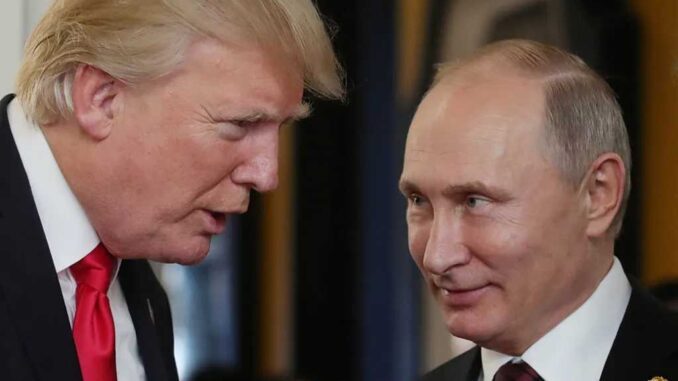
Trump Mulls Controversial Deal with Putin to Block Ukraine’s NATO Bid, Sources Say
Former President Donald Trump is reportedly considering a deal with Russia to prevent Ukraine and Georgia from joining NATO, according to Politico. Unnamed officials close to Trump revealed that this potential plan signals a dramatic shift in U.S. policy regarding Ukraine and its NATO commitments.
Trump, the presumptive Republican presidential nominee, has promised to end Russia’s war against Ukraine within 24 hours if elected, though he has yet to explain how. Recently, two of his top advisors suggested halting military aid to Ukraine unless it agrees to peace talks with Russia.
An insider told Politico that Trump “would be open to foreclosing NATO expansion and not pushing for Ukraine to return to its 1991 borders.” This aligns with previous reports indicating Trump might pressure Ukraine to cede Crimea and Donbas to Moscow.
Despite rejecting Putin’s proposed terms for a ceasefire during a June debate, Trump is also reportedly considering changes to U.S. participation in NATO. One proposal includes a “two-tier NATO” system, granting full defense benefits only to countries meeting the 2% GDP defense spending threshold.
While this plan seems to contradict NATO’s Article 5, which mandates collective defense, Trump’s circle claims the language allows flexibility and doesn’t require military force.
Trump sparked international outrage in February by suggesting he would let Russia do “whatever the hell they want” to NATO countries failing to meet the 2% spending pledge. Critics argue that Trump’s stance on Ukraine and NATO is driven by self-interest. Republican Congressman Don Bacon quoted Trump questioning, “If Ukraine wins, what will be the benefit?”
Stay tuned as this story develops and for further insights into the potential global impact of Trump’s proposed policies.
Leave a Reply